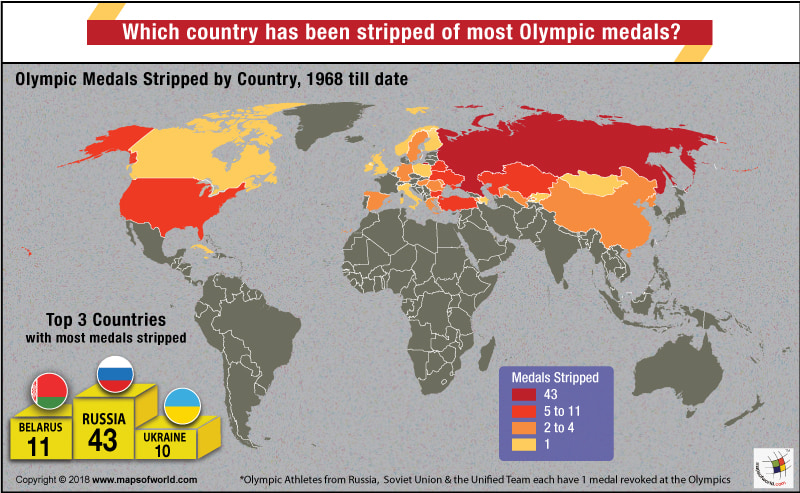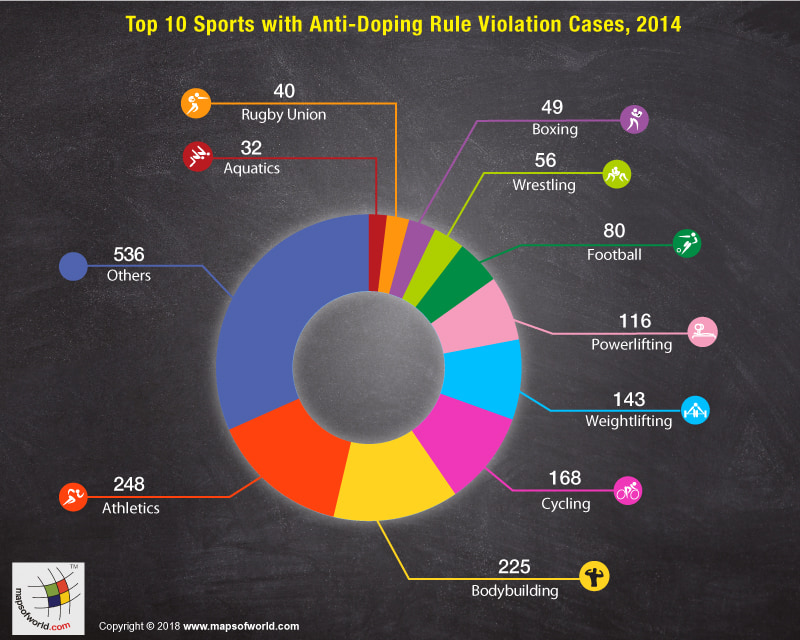Which country has been stripped of most Olympic medals?
The country stripped of the most medals is Russia. From the 1968 Olympic Games to date, 140 medals have been taken away from athletes. Russia has led the way with 43 medals rescinded, followed by Belarus and Ukraine, at 11 and 10, respectively.
The International Olympic Association (IOC) is the governing body that conducts the Olympic Games and therefore, is the only body that is authorized to award or take away medals from participating athletes. The IOC has clear guidelines on the Code of Conduct that applies to all participating athletes in all games conducted by the IOC.
Doping and substance abuse are the most common cause for medals to be taken away from athletes. The other violations have been the breaking of eligibility rules or behavior not conforming to the established standard.
Since 2000, significant improvement in drug detection technology has resulted in more athletes getting caught.
The 2008 Summer Olympics in Beijing witnessed the maximum cases of illegal drug use detected. Fifty medal-winning athletes had their medals revoked by the IOC.
The World Anti-Doping Agency (WADA) has been leading the fight against doping in sports. As per their 2014 Anti-Doping Rule Violations Report (ADRV), Russian athletes were detected for the maximum number violations, but they are certainly not the only country to have athletes lose an Olympic medal.
The country-wise number of ADRV cases reported in 2014:
| Country | ADRV Cases |
| Russian Federation | 148 |
| Italy | 123 |
| India | 96 |
| Belgium | 91 |
| France | 91 |
| Turkey | 73 |
| Australia | 49 |
| China | 49 |
| Brazil | 46 |
| Republic of Korea | 43 |
| Other countries | 884 |
| Sports | ADRV Cases |
| Track & Field | 248 |
| Bodybuilding | 225 |
| Cycling | 168 |
| Weightlifting | 143 |
| Powerlifting | 116 |
| Football | 80 |
| Wrestling | 56 |
| Boxing | 49 |
| Rugby Union | 40 |
| Aquatics | 32 |
| Other | 536 |
Russia and the doping controversy
For years, the former Soviet Union and former East Germany had been leading the medals tally with record-breaking performances, which raised suspicions of their athletes resorting to performance-enhancing drugs. It was only after the doping scandal in cycling came out in the open in 1998 that drew world attention to the widespread use of illegal performance drugs in sport.
The International Olympic Committee was forced to take action, and the first World Conference on Doping was held in Lausanne, Switzerland to address the problem of doping in sport. The outcome was the Lausanne Declaration on Doping in Sport that paved the way for WADA to be established November 10th, 1999, with the forthcoming 2000 Summer Games in Sydney to be the first event to come under WADA’s watchful eye.
The WADA’s attention resulted in the maximum detection of ADRV cases for any Olympic Games at the time of the Sydney games. Athletes from the USA had the maximum number of medals revoked. The 2002 Winter Games saw Russian athletes having the maximum medals revoked. The 2004 Summer Games saw Russia and Hungary both being stripped off three medals each, followed by Belarus and Ukraine with two each, among other countries.
But it was the 2008 Summer Games in Beijing that the all-time maximum number of ADRV cases were detected. It resulted in Russian athletes being stripped off 14 medals in all, the highest ever. It was after the 2008 Summer Games that Russia came under severe pressure from the IOC and WADA to take measures to check doping in sports.
But this did not seem to have much effect on Russia. During the 2012 Summer Games in London, Russia once again topped the list of offending athletes, and 13 medals were taken back by IOC.
Between 2010 and 2013, several whistleblowers from Russia reported widespread use of illegal substances in sport, but in the absence of hard evidence, WADA was unable to initiate any action.
In December 2014, ARD, a German Broadcaster, reported widespread doping in Russia, forcing WADA to set up an Independent Commission in 2015 which had the necessary powers to investigate comprehensively, under a new code.
On November 18th, 2015, the Russian Anti-Doping Agency – RUSADA (set up in 2008), was deemed non-compliant by WADA. It led to senior officials of RUSADA resigning from their posts.
The whistleblower
In May 2016, Dr. Grigory Rodchenkov, a former Moscow laboratory Director, came forward claiming widespread state-sponsored doping program in Russia. It led to the McLaren Committee investigating Russian state involvement. The 1st McLaren Report covered Russian athletes from 2011 to 2015 and confirmed widespread doping that pointed to systemic state involvement.
On December 9th, 2016, the 2nd McLaren Report released its findings based on forensic and biological analysis of Russian Athletes’ urine samples from the 2012 London Games, 2013 Universiade Games, 2013 Moscow IAAF World Championship, and the 2014 Winter Games in Sochi. The report confirmed the involvement of RUSADA, CSP, Moscow Laboratory along with FSB in manipulating doping results through sample switching.
Adverse Reports of Oswald Commission and the Schmid Commission
In July 2016, IOC established the Oswald Commission to investigate doping among Russian athletes during the 2014 Winter Games in Sochi, and set up the Schmid Commission to investigate Russian institutional involvement in doping.
On December 2nd, 2017, the Schmid Commission Report released in Lausanne, Switzerland confirmed the use of ‘Disappearing Positive Methodology’ (DPM) by Moscow Laboratory in manipulating test result outcomes. The Schmid Commission recommended strict action against Russia.
Based on this report, on December 5th, 2017, IOC announced the suspension of Russia from participating in the 2018 Winter Games in PyeongChang. It decided that ‘clean’ athletes from the Russia would be invited, under strict compliance, to participate under the special category ‘Olympic Athletes from Russia’ (OAR).
Related Maps:







